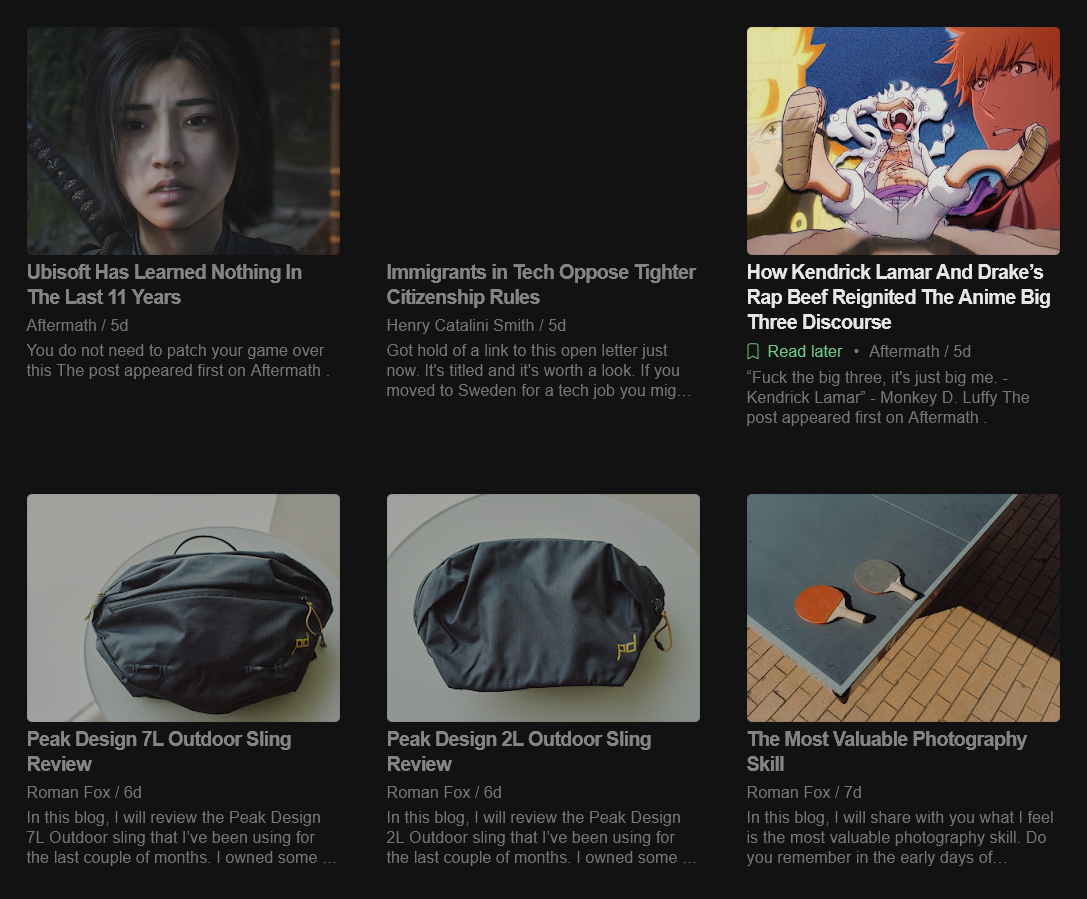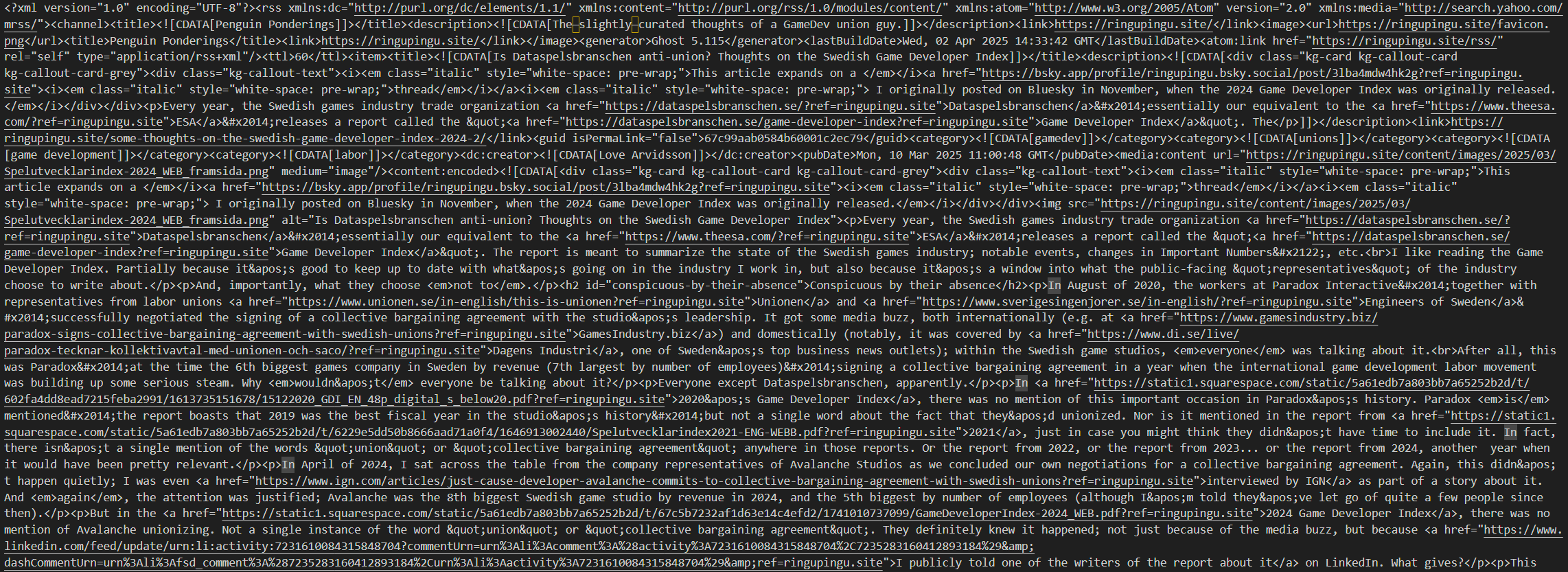RSS Feeds Are Awesome Or: How I Learned to Stop Doomscrolling Using Tech From the “Old Internet”

Like a lot of people who are terminally online, I have a problem with doomscrolling on social media. I've had this problem since before I knew the term doomscrolling, and it's been getting worse in the past year or so—mostly because of... current events in the world, let's say.
Most advice I've heard for reducing the amount of doomscrolling one is doing boils down to "get off social media", which—while probably a mostly good idea—would mean losing access to the vast knowledge and experience of people who I will never have a chance to interact with in person.
I probably wouldn't be working in the industry today if it wasn't for all the information I picked up from social media sites like Twitter and Reddit. Hell, the reason I joined Twitter in the first place was because I'd just finished Thomas Was Alone and wanted to know more about what Mike Bithell had to say about game development.
How do I reconcile these two things? How do I keep my access to the insights of people who know things that I don't, without also being exposed to all the things that come with endlessly scrolling a feed until I develop a thousand-yard stare?
The answer, it turned out, was to go "old school".
If you find my writing interesting, please consider subscribing to my newsletter! You'll get an email whenever I publish something new—it's completely free, and I don't have any plans to monetize anything I write, so it's just for your convenience (and to sate my monkey brain's wish to see numbers go up).
If you're not into newsletters, you could also subscribe to the RSS feed—if you don't know what that is, I wrote about how awesome they are a while back.
Y'all remember RSS?
Hitting it's peak in the early mid-2000's (according to Wikipedia), RSS is "a web feed that allows users and applications to access updates to websites in a standardized, computer-readable format"; in layman's terms, I'd describe it as an all-text version of a website, presented in a format meant to be read by a computer rather than a human.
I'm a child of the mid-90's, so I didn't really engage with RSS feeds when they were at their peak. I associate them with techy elder millenials and Gen Xers—like my older brother, who taught me how to pirate PC games with DC++ when I was 12, inadvertently starting me down the path of gaming obsession that eventually led to me working in the industry.
What RSS feeds let you do, in essence, is subscribe to any feed, anywhere on the internet, and gather the content in one place for your scrolling pleasure. If you're familiar with social media built on the ActivityPub protocol—the most well-known example is probably Mastodon—this might sound familiar; thanks to the standardized format, it's very easy to write your own application for reading RSS feeds, just as you could write an application for reading and writing posts using ActivityPub.
Speaking of ActivityPub!
Ghost recently opened up the beta for their implementation of ActivityPub support, so you can read my posts on any AP client by following @index@ringupingu.site!
What's more, tons of sites still have RSS support built into them. If you go to any Medium or Substack and add "/feed" to the URL, there it is! You can do the same thing with Ghost, which I run this site on!

You can often find the RSS version of a site by searching for the site name and "RSS" in your search engine of choice. Feedly, my current RSS reader, has built-in tools for finding RSS feeds from any given website.
"Quality over quantity"
If you decide to take the plunge into RSS-land, you'll probably find that your feed is distinctly finite. There simply won't be that much content for you to scroll through on a daily basis, because it takes a lot more effort to write long-form blog posts than a throwaway tweet.
The "downside" of this is that you might run out of things to read on your commute to work (although it's so easy to subscribe to more feeds that this is honestly a non-issue), but personally I'm overjoyed to be free of the FOMO of infinite social media feeds.
Not only that, but the content I'm being served is significantly more interesting, thoughtful, and well-written. I find that I spend a lot more time thinking about what I've been reading than I did when most of my scrolling was on Twitter or Bluesky—as evidenced by the list of articles in March's "What I'm Reading/Watching/Playing" post (which I really should finish now that March is over). This is similar to what happened when I left Reddit after they completely fucked over third-party apps; bereft of easily accessible content, I started reading books again.
I'm starting to think the people who say social media is bad for us might be onto something, folks.
Wrapping up
I started this little RSS journey just a few weeks ago, so I can't tell you how it'll go long-term. Maybe I'll subscribe to too many feeds and end up overwhelmed, drowning in a sea of content ( the amount of articles in my "Read Later" list on Feedly seems to be trending upwards already). But right now, it's pretty great.
Now, when I catch myself opening Bluesky or Instagram out of habit, I close it down again and check Feedly.
I don't feel "out of touch"—I've subscribed to a couple RSS feeds from actual newspapers (remember those?), so if anything I'm getting more news than ever—and when I put my phone away it's usually with the thought "I'd like to read some more of that later" rather than "I need a break from the world".
If any of this sounds appealing to you, it's easy to try it out for yourself. Just find an RSS reader—as mentioned, I use Feedly, but there are lots to choose from—and find some feeds to subscribe to (you can start with mine)! Maybe some of the people you already follow on social media have blogs or websites where they post long-form content? Maybe subscribe to the feed of a news outlet you like (the first feed I subscribed to was Aftermath). You're free to curate your content as you like, the world's your oyster.
And as a bonus, all your friends will think you're a massive hipster super cool when you tell them about how you've ditched social media for "retro internet tech".
